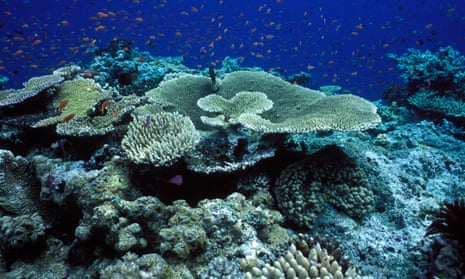Environmental law groups in the US and Australia are pushing Unesco to place the world heritage status of the Great Barrier Reef on an “in danger” list, arguing the Morrison government has violated legal obligations by not doing all it could to protect the world’s biggest coral reef system.
Earthjustice, based in San Francisco, and Environmental Justice Australia say the federal government is failing to live up to an obligation under the World Heritage Convention that member countries do all they can, including dedicating “the utmost” of their resources, to protect and conserve protected sites.
In a report submitted to Unesco’s world heritage committee, the groups say that while no single country can solve the climate crisis, Australia is not playing its part as it does not support policies consistent with keeping global heating to less than 1.5C above pre-industrial levels.
Government agency the Great Barrier Reef Marine Park Authority confirmed in April that the reef had suffered a third mass bleaching event in five years due to increased water temperatures.
Noni Austin, a lawyer with Earthjustice’s international program, said Australia was failing to protect the reef from “the ravages of global warming” and the committee should hold it to account when it next meets.
“In singling out Australia for its oversized contribution to the climate crisis, the World Heritage Committee would be joining United Nations human rights treaty bodies, the United Nations Environment Program and independent experts who have called on Australia to take strong climate action by reducing its devotion to fossil fuels,” she said.
The committee was due to review the reef’s world heritage listing at a meeting starting later this month, but it has been postponed due to the Covid-19 crisis. This year’s review was scheduled when the Australian government successfully contested an in-danger listing five years ago.
The committee had agreed in 2014 to consider putting the reef on the in-danger list due to concern about development along the Queensland coast. The possible downgrading spurred a diplomatic and ministerial lobbying campaign by the then-Abbott government and the introduction of new policies including banning the dumping of capital dredge spoil in the world heritage area and limiting agricultural runoff on to the reef.
Australian representatives told a meeting of the committee last year that climate change should not be used as the basis for an in-danger listing. Stephen Oxley, an environment department official, said climate was a global, not site-specific, problem and the committee needed to find a way to recognise that whole categories of world heritage properties, including coral reefs, glaciers and mountain forests, were threatened by it.
The legal groups’ report stresses the reef’s plight has worsened since the 2015 review, noting a marine park authority report last year found its outlook had deteriorated from poor to very poor and acknowledged greenhouse gas emissions were the greatest threat to its health. Aerial surveys in March found coral bleaching this year was the most widespread and second most severe event of its type on record.
Ariane Wilkinson, a senior lawyer at Environmental Justice Australia, said an in-danger listing was now warranted on climate grounds. She said the group’s legal analysis made clear that Australia was violating its legal obligations by not aligning its actions with limiting heating to well below 1.5C.
She said country was not on track to miss its “abysmally low” emissions reduction targets, was one of the world’s largest exporters of coal and liquified natural gas, and planned to continue to export fossil fuels for decades to come.
“An in-danger listing will increase pressure on the Australian government to take swift action to protect this critically important and magnificent ecosystem,” Wilkinson said.
A spokesperson for the environment minister, Sussan Ley, said the government was deeply committed to protecting the reef, demonstrated through its Reef 2050 plan, which focuses on reducing local and regional pressures to improve resilience to climate change. With the Queensland government, it was spending $2.7bn on reef protection, including research into restoration and adaptation, crown-of-thorns starfish control and water quality improvement.
“We acknowledge that climate change is the greatest threat to all of the world’s coral reefs, including the Great Barrier Reef, and Australia continues to take effective and practical action as part of a coordinated global effort,” the spokesperson said.
The world heritage committee’s new climate policy, which will replace out-of-date guidelines from 2007, was due to be completed last year but is yet to be approved.
The UN’s Intergovernmental Panel on Climate Change in 2018 found the published evidence suggested a majority of tropical coral reefs would disappear even if heating was limited to 1.5C and would be “at very high risk” at 1.2C. The globe has warmed about 1C since the industrial revolution.
Imogen Zethoven, director of strategy at the Australian Marine Conservation Society, said it would be a “game-changer” if the committee recognised the climate crisis endangered the reef and required the government to introduce policies aligned with limiting heating to below 1.5C.
She said it would send a message that countries must take responsibility for their contribution to climate change-related damage to world heritage sites.
Scott Heron, an associate professor in physics at James Cook University, backed the facts set out in the legal groups’ report and agreed the committee needed an effective policy to deal with the impact of climate change on heritage sites. But he said the in-danger list was developed to respond to local pressures, not the climate crisis.
Heron said he and Jon Day, from the ARC Centre of Excellence for Coral Reef Studies, had developed a tool to assess the climate vulnerability of each protected site. “Climate change is a global issue and so needs an alternative approach,” he said.
